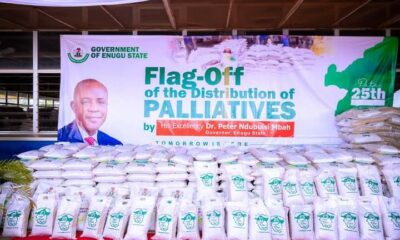Energy
ExxonMobil-Seplat Shares Deal: Has NNPC Misfired?
ARTICLE by Josiah Adewale


An exciting deal
The business world and corporate Nigeria, especially the oil and gas industry, was literally lit and agog following the announcement by Seplat Energy Plc., a leading indigenous energy company listed on the Nigerian Exchange and the London Stock Exchange, and Exxon Mobil Corporation, Delaware, USA (ExxonMobil) that they had entered into an agreement for the Seplat to acquire the entire share capital of Mobil Producing Nigeria Unlimited (MPNU) from the latter, subject, however, to the usual Ministerial Consent.
The President, ExxonMobil Upstream Oil and Gas, Liam Mallon, said the company sold its equity interest in its shallow-water business, Mobil Producing Nigeria Unlimited (MPNU), to Seplat Energy through Seplat’s wholly-owned Seplat Offshore.
Rendering highlights of the deal, which is the first of its kind since the coming on stream of the Petroleum Industry Act (PIA), Seplat, on its part, put the purchase price at $1,283 million plus up to $300 million contingent consideration.
The transaction, it said, would create one of the largest independent energy companies on both the Nigeria Stock Exchange and London Stock Exchange as well as bolster Seplat Energy’s ability to drive increased growth, profitability and overall stakeholder prosperity, delivering 186 per cent increase in production from 51,000 bpd to 146,000 bpd or 170 per cent increase in 2P liquids reserves, from 241 MMbbl to 650 MMbbl.
In addition, it was expected to deliver a 14 per cent increase in 2P gas reserves from 1,501 Bscf to 1,712 Bscf, plus significant undeveloped gas potential of 2,910 Bscf (JV: 7,275 Bscf).
Nigerians are excited as they await the final Ministerial Consent to bring such strategically important national assets fully into Nigerian ownership alongside the Nigerian National Petroleum Corporation, NNPC, the exiting Joint Venture Partner. This is in line with government’s objective to achieve a pragmatic, progressive and just energy transition for Nigeria.
In its incisive analysis, Wood Mackenzie (WoodMac), a global and reputable intelligence provider that empowers decision-makers with unique insights on the world’s natural resources, lauded the deal saying it was a win-win for Seplat, ExxonMobil, and the Nigerian government, offering huge upside for oil and gas.
Very instructively, Mackenzie added: “Because this is a corporate acquisition, NNPC has no rights to pre-empt a deal under the Joint Operating Agreement (JOA), which governs the JV. This means that ministerial consent would be the only hurdle remaining, although nothing can be taken for granted.
A Misinterpretation of Joint Venture Agreement
Unfortunately, amid this local and international acclaim, the NNPC appears strangely more interested in throwing spanner in the works. In a move to block the transaction, the NNPC, as widely reported in the media, has through its Group Managing Director (GMD), Mele Kyari, written to MPNU, notifying it of its intention to exercise a Right of Pre-emption over the deal.
“We are aware that you reached an agreement to divest from onshore and shallow waters JVs…. Clearly we are interested”, the GMD was quoted as stating.
Meanwhile, a recently published article in support of NNPC’s action quoted purported oil industry source of affirming NNPC’s rights under the law, to exercise such pre-emptive powers.
NNPC hinges its move on a June 28, 1990 Joint Operating Agreement between it and Mobil Producing Nigeria as it pertains to ‘Participating Interest”.
Regarding transfer and assignment of interest, Article 19.4 provides: Subject to sub-clauses 19.1 and 19.2, if any Party has received an offer from a third Party, which it desires to accept, for the assignment or transfer of its participating hereunder (the “Transferring Party”), it shall give the other Party prior right and option in writing to purchase such Participating Interest as provided in sub-clauses 19. 4.1 to 19 .4.2.
Sub-clause 19.4.1 provides: The Transferring Party shall first give notices to the other Party, specifying therein the name and address of the aforementioned third Party and the terms and conditions (including monetary and other consideration) of the proposed assignment and transfer.
Sub-clause 19 .4.2 states: “Upon receipt of the notice referred to in Sub-clause 19. 2.1, the other Party may within thirty (30) days thereafter, request in writing the assignment and transfer of such Participating Interests to it, in which event the assignment or transfer shall be made to it on the same or equivalent terms”.
Meanwhile, these provisions could not be read or understood in isolation of the definition of a “Participating Interest” by the same Agreement.
Article 1.24 states: “Participating Interest means the undivided by percentage interest from time to time held by the Parties in the concession (s), the Joint Property and rights and obligations under this Agreement, namely: sixty per cent (60%), in case of NNPC; and forty (40 per cent), in the case of Mobil”.
Thus, these provisions clearly show that the NNPC is absolutely mixing things up because the transaction that happened between Seplat and ExxonMobil, Delaware, USA, was nothing close to a transfer of a “Participating Interest”.
No! Seplat did not deal with Mobil Nigeria producing Unlimited (MNPU). Rather, it transacted business with ExxonMobil, Delaware, the parent company, which acted within its rights, as it pleased and in line with its business/investment strategy, to dispose of all its shares in MNPU, which owns the said assets in Nigeria.
This is the major fact NNPC needs to get right so it could stop convoluting a very simple matter and making Nigeria a laughing stock before the international business community, as it visibly has no Right of First Refusal (RFR) to exercise on this transaction.
Matters arising
In any case, the ExxonMobil-Seplat transaction is not the first in the industry in recent times. Many have wondered why the NNPC did not exercise the same pre-emption action in the divestments by SPDC.
Of recent, the NNPC, and analysts pushing its case have argued that with its transition into a registered profit-making and limited liability company vide the PIA, it was out to reshape and optimise its portfolio by acquiring assets with high performance, low vulnerability and huge gas potential. For this reason, it prioritises the acquisition of divested assets under MPNU JV over those in Shell Petroleum Development Company (SPDC) JV.
In other words, NNPC‘s sudden interest in the deal and taking over the entire JV (if it had the legal backing) is all about the attractiveness of the assets in question. As a government-backed entity, is it not supposed to be more interested in taking over perceived more vulnerable assets with higher security and production issues? If it is only interested in ‘juicy’ fleshes of the oil and gas industry, who does it expect to deal with the hard bones?
Worse, it is not even as if the NNPC is known to run these things by itself. Most Nigerians know how and where these portfolios end up.
Besides, the NNPC does not enjoy popularity as one of the managers. If the NNPC were to be an airline, it is to be wondered how many Nigerians would be confident to fly in its planes. If NNPC were a hospital, how many Nigerians would surrender their lives to it to manage?
As the sole importer of fuel, Nigerians are still dealing with not only intermittent biting fuel scarcity, but they are also yet to recover from the importation of toxic fuel that have wrecked vehicles and put households through hardships.
Worse, the NNPC is yet to tell Nigerians how the nation’s daily fuel consumption jumped from about 30 million litres about seven years ago to about 102 million litres and above.
Under NNPC’s watch, the refineries have degenerated from producing enough for local consumption, to producing little, and now nothing.
In 2020, NNPC recorded N10.27 Billion in operational expenses without refining a single drop of fuel. It is unable to fix any of the refineries, even with the award of a USD1.5 Billion contract last year to fix the Port Harcourt refinery.
The NNPC has been struggling to meet its statutory obligations to the Federation Account in recent years. Despite the surge in oil prices in the international market, it was unable to remit anything to the Federation Account in January 2022, making it the second time within a year, as it was the case in April 2021.
In fact, with a deficit of approximately N2 Trillion out of its projected N2.511 Trillion, NNPC was only able to disburse N542 billion as against the N2.511 Trillion it was budgeted to contribute. The Nigeria Governors Forum have protested the development.
Therefore, many Nigerians have wondered why a debt-burdened NNPC is so quick to accumulate more debts vide the $5 billion corporate finance commitment from the African Export-Import Bank (Afreximbank) to “acquire, invest and operate energy-producing assets in Nigeria as part of NNPC’s growth strategy following its incorporation as a limited liability company”. It is important to note that unlike other businesses that would secure their loans by their assets, NNPC rides on government’s back.
The question of prioritisation of gas
Meanwhile, it is reported that NNPC’s interest in taking 100 possession of the assets in question was informed by its efforts not to risk a another partner on the NNPC MPNU JV that might not see the monetisation of the assets gas component as a priority.
This should not even be considered given Seplat’s profile in gas investment and its leading role in Nigeria’s energy transition.
It produced 20,758 boepd gas in 2021 and supplies 30 per cent of gas to power Nigeria. It became the first company to record a 50-50 venture with the NNPC through the Seplat/NNPC gas plant project – ANOH Gas Processing Company (AGPC) where Seplat easily raised $260 Million through a consortium of banks to fund its part of $650 Million financing for the ANOH Gas Processing Plant.
Against these backdrops, it is understandable why industry players believe that the NNPC has not only misfired, but is also overreaching itself, playing up those needless interferences that discourage investors. It should retreat.
*Adewale is an energy analyst
Energy
AVEVA Appoints Joanna Mainguy as New Sustainability Accelerator Director


- Joanna Mainguy will steer strategies for sustainability innovation across AVEVA’s portfolio and partner ecosystem, furthering ESG targets for 2025 and beyond
AVEVA, a global leader in industrial software, driving digital transformation and sustainability, today announced the appointment of Joanna Mainguy as Sustainability Accelerator Director.
Joanna’s appointment testifies to AVEVA’s dedication to strengthening the company’s sustainability impact in line with advancing global climate commitments.
As Sustainability Accelerator Director, Joanna Mainguy will focus exclusively on sustainability solutions and strategies to accelerate innovation that will help AVEVA’s customers to achieve their net-zero targets.
She will look at how AVEVA leverages current market and customer analysis to inform its in-house development team, advise on new customer collaborations and on how AVEVA should grow its partnership network and M&A pipeline to reflect its sustainability priorities.
Joanna will lead the implementation of a sustainability solutions plan tailored to meet the most pressing needs of AVEVA’s industrial customers on low-carbon transition, circularity and resilience, via an integrated product, marketing and sales approach. She will work closely with AVEVA’s portfolio, business area and R&D leads to continue to develop new sustainability capabilities and drive collaboration on go-to-market initiatives that support industry with contributing to an accelerated energy transition and shift to a circular economy.
Joanna was formerly Industry Director, EMEA, for Energy & Sustainability at Microsoft, where she led strategic engagements with major energy providers and supported the energy transition with digital solutions. She has worked across the entire energy value chain and has more than 15 years of experience in process industries and the energy sector, including work for major system integrators, software and energy companies.
Lisa Wee, Global Head of Sustainability, AVEVA, said: “We are excited to welcome Joanna to AVEVA. She will bolster our mission to enable faster uptake of existing sustainability solutions across the industrial landscape, while in parallel we continue to invest in product capabilities and partnerships that will push out the frontiers of sustainability innovation for industry. At AVEVA we look to lead by example on sustainability and we achieved a 93% reduction in Scope 1 and 2 emissions last year. We aspire to help our customers better leverage digital solutions to realize their own ambitious sustainability targets early, and Joanna brings a wealth of experience to help support this.”
Commenting on her appointment, Joanna Mainguy, Sustainability Accelerator Director, AVEVA, said: “I am delighted to join AVEVA at such a pivotal time in its sustainability innovation and growth trajectory. I look forward to working with AVEVA teams and customers to continue to grow the sustainability benefits that can be achieved with AVEVA software. I am also keen to work closely with our partners to drive further positive change at scale, since we know addressing the climate crisis will continue to require expanded collaboration”.
AVEVA actively embeds sustainability into its core product strategy with specific capabilities in its software portfolio.
AVEVA’s software enables organizations to connect and contextualize key sustainability data with artificial intelligence and human insight, enhancing their agility, resilience and sustainability in order to help drive responsible use of the world’s resources.
AVEVA’s 2023 Sustainability Progress Report reveals significant progress across all three pillars of the company’s sustainability framework, encompassing product strategy, operations and culture.
Energy
Climate Change: NNPC Ltd/Total Energies JV Achieves Zero Gas Flare



In pursuit of meeting the targets of 20% (unconditional) and 47% (conditional) greenhouse gas emission reduction as contained in the Nationally Determined Contribution under the Paris Accord signed by the President Bola Ahmed Tinubu administration, the NNPC Ltd/TotalEnergies Joint Venture has achieved zero routine gas flare in all its assets.
According to a statement signed by Olufemi Soneye, Chief Corporate Communications Officer, NNPC Ltd., this feat was announced on Thursday during an inspection tour of OML 100 in South-eastern Niger Delta, off Port Harcourt, by a joint NNPC Ltd and TotalEnergies Team to ascertain the success of the OML Flare Reduction Project launched in December 2023.
The NNPC Ltd/TotalEnergies Joint Venture, which is the concession holder of four leases, had hitherto achieved zero routine flaring across OML 99 (2006), OML 102 (2014), and OML 58 (2016), leaving OML 100 as the only lease with routine flaring going on.
The significance of this achievement is that the last routine flare volume of about 12MMscf/d (twelve million standard cubic feet per day) of gas has now been eliminated giving rise to a greenhouse gas emissions reduction of about 341KtCO₂e/yr.
The achievement is an outcome of a programme introduced by the NNPC Ltd to galvanize action towards achieving the zero routine flare by 2030 across its portfolio of assets.
It is also a testament to NNPC Ltd’s prioritization of sustainability anchored on the ‘first R’ of its 5R Strategy (Reduce, Replace, Renew, Re-plant, Repurpose), as it strives to reduce its carbon footprint.
Work is ongoing across all other assets within NNPC Ltd’s Upstream Directorate to ensure that all assets achieve zero routine flaring by 2030 or earlier.



In line with President Bola Ahmed Tinubu’s directive to the Nigerian National Petroleum Company Limited (NNPC Ltd) to optimise production from the nation’s oil and gas assets, the Company has announced the successful commencement of oil production from the Akpo West Field.
The milestone, which is the result of meticulous planning, strategic collaboration, and unwavering dedication from all stakeholders involved in the project, will add 14,000 barrels per day condensate to the nation’s production. This will be followed up by the production of about 4million cubic meters of gas per day by 2028.
The development of Akpo West which is on Petroleum Mining Lease (PML) 2 (formerly OML 130) leverages the existing Akpo Floating Production Storage and Offloading (FPSO) facility via a subsea tie-back to keep costs low and minimize greenhouse gas emissions.
The milestone was enabled by the strategic leadership of the Group Chief Executive Officer (GCEO), Mr. Mele Kyari, and the Upstream Directorate of the NNPC Ltd whose support played no small role in propelling the operators to actualise the short- and mid-term hydrocarbon production goal of the President Tinubu administration.
Located 135 kilometres offshore, Akpo West is one of the discoveries on PML 2 with proximity to the Akpo main which started up in 2009 and produced 124,000 barrels of oil equivalent per day in 2023.
PML 2 is operated by TotalEnergies with a 24% interest, in partnership with CNOOC (45%), Sapetro (15%), Prime 130 (16%), and the Nigerian National Petroleum Company Ltd as the concessionaire of the Production Sharing Contract (PSC).
-



 Transport4 days ago
Transport4 days agoFederal Government To Launch Out 2700 CNG Buses, Tricycles Ahead Of First anniversary Of Tinubu’s Administration
-



 News4 days ago
News4 days agoNigeria Has Secured $2.25B World Bank Loan With An Interest Rate Of 1% – Minister Of Finance
-



 News24 hours ago
News24 hours agoNiger State Prisoners Run From Facility After Rainstorm Brings Down Part Of Fencing
-



 Tech19 hours ago
Tech19 hours agoAnambra School Emerges Winner In National Girls In ICT Competition With Groundbreaking VR Technology
-



 Finance2 days ago
Finance2 days agoGodwin Emefiele Disobeyed Direction Of Law With Intent To Harm The Public, He Printed ₦684.5M Using ₦18.9B Says EFCC in fresh charge
-



 Spotlight23 hours ago
Spotlight23 hours agoNigerian Woman Breaks Guinness World Record With 55-Hour Interview Marathon
-



 News3 days ago
News3 days agoEFCC: Former Governor Of Kogi State, Yahaya Bello Fails To Show Up In Court, Says He Is Scared Of Arrest
-



 Politics13 hours ago
Politics13 hours agoEnugu State Government Flag Off Palliative Distribution In The State






